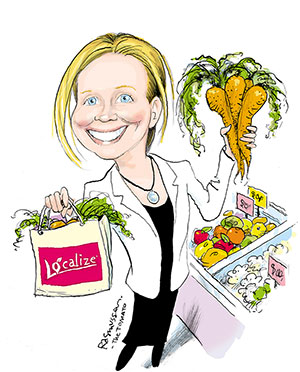In the late nineteenth century, French novelist Marcel Proust participated in an exercise which could be thought of as the Facebook of its era — he answered a questionnaire about himself in a friend’s Confession Album.
Proust’s answers have been published, in one form or another, for more than a century. Many have used the questionnaire for their own devices, the most notable being Vanity Fair’s Proust Questionnaire featuring celebrities. The Tomato now gives it a culinary twist.
 Local has become a culinary buzzword in recent years. “We have found that there has been a significant change in consumer behaviour — they want to support the local economy, but cannot always see how,” says Meghan Dear, founder of Localize your Food.
Local has become a culinary buzzword in recent years. “We have found that there has been a significant change in consumer behaviour — they want to support the local economy, but cannot always see how,” says Meghan Dear, founder of Localize your Food.
“Grocery shelves are competitive places; it’s challenging for a small company to get exposure. We make it easy for consumers to see these products on a grocery shelf. On the other hand, the grocer faces a lot of demands from their customers for local products. It’s not easy for them to put together a plan, and we help monitor sales and profitability.”
Localize creates transparency. The labeling system helps shoppers learn at a glance where products come from and other information about its production.
Meghan Dear started Localize in 2011.
“I was inspired by work in Africa. Some of the issues I saw with small-scale agriculture there were similar to issues I saw here in Canada. Mainly, that it’s difficult to market your product when you are little.
“If you don’t have a market you don’t have a lot of power, so anything that enhances your ability to access markets will enhance your ability to thrive.
“It’s incremental, we label hundreds of products across a grocery store which turns into hundreds of thousands of dollars each year. We simply celebrate what is local and give companies a tool to measure it.”
You’ll find Localize labels on items in several grocery stores and the company is expanding to over 250 stores in Western Canada this summer.
Localize Ltd. won the top prize of $100,000 in the 2014 VenturePrize Fast Growth competition, which supports emerging Alberta businesses. localizeyourfood.com
Hometown?
Wetaskiwin, I’m a farmer’s daughter.
Where would you like to live?
Rural Alberta, its where my roots are. That’s the big dream, escape the city and go back to the roots.
Your favourite food and drink?
I could have cheese for breakfast, lunch and dinner. I’m a huge coffee fan. I make a latte every morning with my stove top espresso machine.
What would you be doing if you weren’t localizing?
I’d be farming vegetables, a market garden. My dad’s retiring this year; if there were two of me one of us would be taking over that farm.
What do you most appreciate in your friends?
Authenticity. I’ve come to appreciate people who are chasing things that are important to them — aligning what they are doing for a living with what they care about.
Your favourite qualities in a Localize partner?
Problem solving. We work with multiple partners, grocery stores, food producers and customers. When we are able to align everyone’s interests we have a perfect and powerful trio.
Who would be at your dream dinner table (dead or alive)?
Margaret Atwood, George Stroumboulopoulos, Wendell Berry.
Who would cook?
My dad, with potatoes and beets straight out of the garden.
Which words or phrases do you most overuse?
In my work these words matter a lot; process, scalability and impact.
Current culinary obsession/exploration?
Kale. It’s in my blender, my wok, my oven, finding its way into everything.
Meaningful/crazy food experience?
I lived in an undeveloped region of northern Ghana. Meal preparation was done over coal fires, and everything was an ingredient until you made it. The daily staple is tzed, a thick porridge of fermented millet. You walk for two miles to mill the grain, then it has to ferment over 24 hours. That makes the millet more flavourful and nutritious, as the fermenting breaks down the protein, making it more available. You make only enough for the next day, and then you cook it. I cherish the memory of waiting an hour while the tzed cooks. It gives me pause — food takes a lot of effort there, it takes a lot of time and a lot of women’s hours.
Mentors?
From three years ago, not knowing how to run a business, to where we are now is because of a lot of people who have spent time with me. An example is great friend Ashley Good who taught me how to fail fast. When I started out, my big idea was just that, an idea. She helped me find a way to test it quickly to see if it had legs, and the confidence to start talking to grocery stores, which was way on the other side of my comfort zone. Get it out there, see if it can run.
Philosophy?
Commit.
What’s next?
We won the 2014 Venture Prize — a top business award for fast growth companies. It’s a validation that we built something that can support local anywhere. It seemed unlikely that a little local food labeling company could win, but we successfully demonstrated how we plan to turn this into a world-wide application (patent pending). Any grocery store, anywhere.